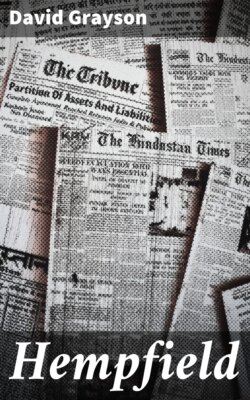Читать книгу Hempfield - Grayson David - Страница 10
На сайте Литреса книга снята с продажи.
FUDGE
ОглавлениеTable of Contents
A fellow named Wright, who lives out in Ohio, says he can fly. Mr. Wright is wrong. If the Lord had intended human beings to fly He would have grown wings on us. He made birds for the air, and fish for the sea, and men to walk on two legs. It is a common characteristic of flying-machine inventors and Democrats that they are not satisfied with the doings of the Lord, but must be turning the world topsy-turvy. Mr. Wright of Ohio should peruse the historic story of Darius Green and his flying machine. If memory serves us right Darius bumped his head, and afterward lived a sensible life. The Star would commend the example of Mr. Green to Mr. Wright—and the Democrats.
Harriet heard me laughing, and called from the other room:
"David, what are you laughing at?"
"Why, a new judge in Israel"—and I read the paragraph aloud with the keenest delight.
"But I thought Mr. Wright could fly!" said my sister doubtfully.
"Well, he can," said I, "only this writer is a Republican."
She was silent for a moment, standing there in the doorway while I watched with interest the gathering question.
"But I don't see why a Republican—if he can fly——"
"Harriet," I began rather oratorically, "this is a very interesting and amusing world we live in, and it is fortunate that we do not all believe everything we see or hear—at any rate, I'd like to meet the man who wrote that paragraph. I feel certain that he is one of the everlasting rocks of New England."
It was this amusing little incident, rather than the really serious purpose that lay back of it, that sent me at last to Hempfield. I kept thinking about the man of the paragraph as I went about my work, chuckling in the cow stable or pausing when I was putting down the hay. I imagined him an old fellow with gray chin whiskers, a pair of spectacles set low on his nose, and a frown between his eyes.
"How he does despise Democrats!" I said to myself.
And yet—our instinct for the compensatory view being irresistible—a pretty good old chap! I thought I should like him, somehow.
One early morning in May, the spring having opened with rare splendour, I hitched up the mare and drove to town. Ostensibly I was going for a few ears of seed corn, a new tooth for my cultivator, and a ham for Harriet—so is the spirit bound down to the mundane—but in reality I was looking for the man who could say "Fudge" with such bluff assurance.
It was a wonderful spring morning, and I did not in the least know as I drove the old mare in the town road, with all the familiar hills and trees about me, that I was going into a new country, fairer by far than ours, where the clouds are higher than they are here, and the grass is greener, where all the men grow taller and the women more beautiful.
I asked Nort once, long afterward, if he could remember the first impression he had when he came to Hempfield and saw the printing-office. Nort frowned, as though thinking hard, and made a characteristic reply:
"I don't rightly remember," said he, "of having any first impression, until I saw Anthy."
It sat there in its garden and watched with mild interest the hasty world go by
But I will not be hurried even to my meeting with Anthy; for I have a very vivid first impression of the printing-office as it sat like a contemplative old gentleman in its ancient and shabby garden.
First we see things with our eyes, see them flat like pictures in a book, and that isn't really sight at all. Then some day we see them with the heart, or the soul, or the spirit—I'm not certain just what it is that really sees, but it is something warm and strong and light inside of us—and that is the true sight.
I had driven the streets of Hempfield for years, and gone in at the grocery stores, made a familiar resort of the gunsmith shop, and visited the post office, but had never really seen the printing-office at all.
Like most things or people really worth knowing, the printing-office is of a retiring disposition. It is an old building, once a dwelling-house, which stands somewhat back from the street, with a quaint old garden around it. An ancient picket fence, nicked and whittled by a generation or so of boys who should have known better, guards its privacy. At the tip of the low cornice is a weatherbeaten bird house, a miniature Greek Parthenon, where the wrens built their nests. Larger and more progressive business buildings had crowded up to the street lines on both sides of it, and yet it managed to preserve somehow an air of ancient gentility. The gate sagged on its hinges, the chimney had lost a brick or two, but it sat there in its garden and watched with mild interest the hasty world go by.
I wondered, that morning, why the peculiar air of the place had never before touched me. I paused a moment, looking in at it with such a feeling of expectancy as I cannot well describe. I did not know what adventure might there befall me. At any moment I half expected to see my imagined old fellow appear on the doorstep and cry out, half ironically, half explosively:
"Fudge!" Upon which, undoubtedly, I should have disappeared into thin air.
There being no sign of life, for it was still very early in the morning, I opened the gate and went in. Over the front door stretched a weatherbeaten sign bearing these words in large letters:
